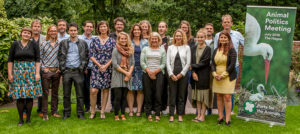ازدهار الحركة العالمية – اجتماع ساسة الدفاع عن الحيوان في لاهاي
في لاهاي، ابتداء من 14 إلى غاية 17 يوليو أتت الأحزاب الأوروبية التي تدافع عن حقوق الحيوانات للاجتماع السنوي لساسة الدفاع عن الحيوان. هذه الأحزاب هي جزء من حركة عالمية متنامية الجماعات منها والأحزاب التي لا تضع في جوهرها مصالح الناس على المدى القصير، ولكن الكوكب بأكمله وجميع سكانه. كانت المكونات الرئيسية لهذا الإجتماع الذي استمر ثلاثة أيام المعرفة، تبادل الخبرات وتعزيز التعاون. وقد نظم الاجتماع من قبل المؤسسة السياسية للحيوان، المؤسسة التي تنظم الأنشطة الدولية للحزب من أجل الحيوانات.

هناك أكثر من 15 حزبا في جميع أنحاء العالم ملتزم بمصالح الحيوانات، الطبيعة والبيئة. و لا يزال هذا العدد يتزايد، وكذلك النجاح والمؤيدين. ليس فقط في هولندا ولكن أيضا في البرتغال (PAN)، ألمانيا (Tierschutz Partei)، أستراليا (حزب العدالة للحيوان) وتايوان (حزب الشجر) تتوفر هذه الأحزاب على ممثل واحد أو أكثر.
في البرتغال، يتوفر PAN الآن على ثلاثة ممثلين في ثلاثة مجالس، وكذلك في البرلمان الوطني منذ العام الماضي. أما PACMA، الحزب الإسباني، فقد كتب التاريخ في الانتخابات الوطنية في يونيو الماضي بحيازته على أكثر من 284،000 صوتا للكونغرس و 1.2 مليون صوت لمجلس الشيوخ. وعلى الرغم من هذا العدد الضخم، لم يحصل الحزب على أي مقعد بسبب الطريقة التي يعمل النظام الإنتخابي في إسبانيا. بالطبع لا يعني ذلك أنه ليس للحزب أي تأثير. فالأحزاب من أجل الحيوانات مثلها مثل الأرنب البري في سباق الماراثون. وعلاوة على ذلك، لن يكون هذا العام مهرجان تورو دي لا فيغا في إسبانيا. بفضل PACMA لم يحصل هذا المهرجان، حيث يقوم المئات من الرجال بمطاردة ثور وقتله بواسطة رمح، على ترخيص هذا العام.
وفي المملكة المتحدة شارك حزب رعاية الحيوان لأول مرة في اسكتلندا وإيرلندا الشمالية. وقد حرز الحزب في لندن على 1٪ من الأصوات. كما نجح حزب العدالة للحيوان الفنلندي في الحصول على ما يكفي من التوقيعات لتسجيل الحزب رسميا. و في أستراليا بدا خلال الانتخابات في وقت سابق من هذا الشهر أن أيضا الدعم يتزايد لحزب العدالة للحيوان، والذي قد ينتج في فيكتوريا مقعدا في مجلس الشيوخ.
From 14 to 17 July 2016, European parties for animals gather in The Hague for the annual Animal Politics Meeting. They are part of a growing worldwide movement of groups and parties that do not put the short-term interests of man in the pivotal position, but the entire planet and áll her inhabitants instead. During the meeting in The Hague transferring and exchanging knowledge and strengthening cooperation are key ingredients. The conference is organised by the Animal Politics Foundation, the foundation responsible for the Party for the Animals’ international activities.

At the moment, there are over 15 parties for animals worldwide that are dedicated to the interests of animals, nature and environment in politics. In The Netherlands (Partij voor de Dieren), Portugal (PAN), Germany (Partei Mensch Umwelt Tierschutz), Australia (Animal Justice Party) and Taiwan (Trees Party), these parties have representatives. The number of parties for animals is still growing, and so is their support.
In Portugal, the party for People, Animals and Nature (PAN) is represented in three councils, and since last year also in national parliament. PACMA, the Spanish party for animals, wrote history in the national elections of last June with over 284,000 votes for the Congress and 1,200,000 votes for the Senate. Despite the large number of votes, the party is not awarded any seats in the parliament – unprecedented in Spanish parliamentary history. This is because of how the electoral system and the electoral district work in Spain. However, not having a seat does not mean not having influence. Parties for animals are like pacers in the marathon. In Spain, thanks to PACMA there will be no Tora de la Vega festival this year, an event where hundreds of men chase after a bull and then kill it with lances.
In the UK, the Animal Welfare Party was standing for the first time in Scotland and Northern Ireland, and in London they got almost 1% of the votes. The Finnish Animal Justice Party succeeded in getting enough signatures to register the party officially. In Australia, the elections earlier this month show that the support for the Australian Animal Justice Party is growing, which in Victoria may result in a seat in the Senate.
At the Animal Politics Meeting subjects such as preparing for the next elections, building a strong party structure and campaigning experiences are shared by the seven countries attending.